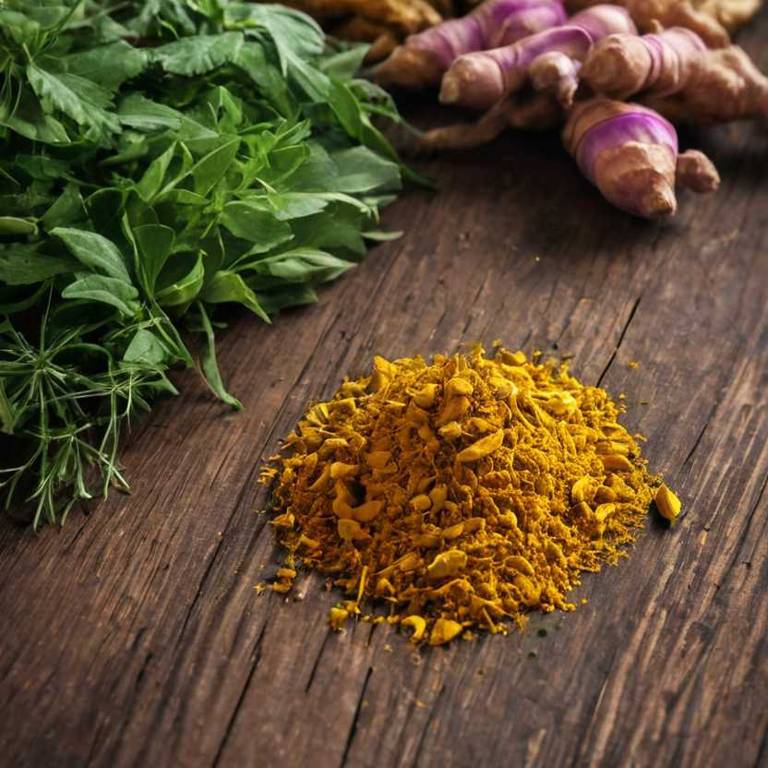10 Best Curcuma Aromatica Preparations

The best medicinal preparations of Curcuma aromatica are teas, decoctions, tinctures, oils, and creams, each offering unique benefits for health and wellness.
Teas made from the dried rhizomes are commonly used to support digestion and reduce inflammation.
Decoctions, which involve simmering the herb, are valued for their deeper extraction of active compounds.
Tinctures provide a concentrated form of the herb for easier dosage control.
Essential oils and topical creams derived from Curcuma aromatica are widely used to alleviate pain and promote skin health.
These preparations highlight the versatility and therapeutic potential of this valuable herb in traditional and modern medicine.
Below there's a list of the 10 best herbal preparations of curcuma aromatica for medicinal purposes.
1. Teas
Curcuma aromatica teas is commonly used to promote digestive health, reduce inflammation, and support overall wellness.
This herbal preparation is widely utilized to treat ailments such as indigestion, bloating, and inflammatory conditions like arthritis. The most common medicinal uses include alleviating gastrointestinal discomfort and managing symptoms of respiratory and skin conditions. The bioactive constituents responsible for its medicinal properties include curcuminoids, such as curcumin, and volatile oils like turpentine and cineole.
These compounds possess antioxidant, anti-inflammatory, and antimicrobial effects, contributing to the plant's therapeutic value.

2. Decoctions
Curcuma aromatica decoctions is commonly used to treat digestive disorders, inflammation, and skin conditions.
These decoctions are often employed in traditional medicine to alleviate symptoms of indigestion, bloating, and gastrointestinal discomfort. They are also used to reduce inflammation in conditions such as arthritis and skin infections. The bioactive constituents responsible for these effects include curcuminoids, such as curcumin, demethoxycurcumin, and bisdemethoxycurcumin, which possess anti-inflammatory, antioxidant, and antimicrobial properties.
Additionally, volatile oils and sesquiterpenes contribute to the plant's therapeutic effects.

3. Tinctures
Curcuma aromatica tinctures is commonly used to treat inflammation, digestive issues, and skin conditions due to their potent medicinal properties.
These tinctures are often employed to alleviate symptoms of arthritis, menstrual cramps, and gastrointestinal disorders such as bloating and indigestion. The most common ailments addressed include joint pain, digestive discomfort, and skin inflammation. The bioactive constituents responsible for these effects include curcuminoids, such as curcumin, which exhibit strong anti-inflammatory and antioxidant properties.
Additionally, volatile oils and sesquiterpenes contribute to the plant’s therapeutic benefits by supporting digestion and reducing oxidative stress in the body.

4. Oils
Curcuma aromatica oils is commonly used to treat inflammatory conditions, digestive disorders, and skin ailments.
The oil is often applied topically for its anti-inflammatory and antimicrobial properties, and it is also taken internally to support digestion and reduce gastrointestinal discomfort. Common medicinal uses include treating arthritis, muscle pain, and skin infections such as eczema and fungal infections. The bioactive constituents responsible for these effects include curcuminoids, such as curcumin, which have potent antioxidant and anti-inflammatory properties.
Additionally, essential oils from Curcuma aromatica contain terpenes and phenolic compounds that contribute to its therapeutic benefits.

5. Creams
Curcuma aromatica creams is commonly used to treat inflammatory conditions, skin disorders, and joint pain.
These creams are often applied topically to alleviate symptoms of arthritis, eczema, and psoriasis due to their anti-inflammatory and antioxidant properties. The most common medicinal uses include reducing swelling, soothing skin irritations, and providing relief from muscle aches. The bioactive constituents responsible for these effects include curcuminoids, such as curcumin, which have potent anti-inflammatory and antioxidant activities.
Additionally, essential oils and other phytochemicals in the cream contribute to its therapeutic benefits.

6. Capsules
Curcuma aromatica capsules is commonly used to support digestive health, reduce inflammation, and alleviate symptoms of various chronic conditions.
These capsules are often prescribed for ailments such as digestive disorders, arthritis, and skin conditions due to their potent anti-inflammatory and antioxidant properties. The most common medicinal uses include treating indigestion, bloating, and gastrointestinal discomfort, as well as managing inflammatory diseases like rheumatoid arthritis. The bioactive constituents responsible for these effects include curcuminoids, such as curcumin, demethoxycurcumin, and bisdemethoxycurcumin, which exhibit strong anti-inflammatory, antioxidant, and antimicrobial activities.
Additionally, essential oils and sesquiterpenes present in the plant contribute to its therapeutic benefits.

7. Oinments
Curcuma aromatica oinments is commonly used to treat inflammatory conditions, skin disorders, and musculoskeletal pain.
These ointments are widely applied for ailments such as arthritis, eczema, and muscle strains due to their anti-inflammatory and analgesic properties. The most common medicinal uses include reducing swelling, alleviating pain, and promoting skin healing. The bioactive constituents responsible for these effects include curcuminoids, such as curcumin, demethoxycurcumin, and bisdemethoxycurcumin, which have potent antioxidant and anti-inflammatory activities.
Additionally, volatile oils and sesquiterpenes contribute to the ointment’s therapeutic effects by enhancing skin penetration and providing antimicrobial benefits.

9. Syrups
Curcuma aromatica syrups is commonly used to treat digestive issues, inflammation, and respiratory conditions.
This herbal preparation is often utilized for ailments such as indigestion, gastritis, and bronchitis due to its soothing and anti-inflammatory properties. The most common medicinal uses include alleviating stomach discomfort, reducing inflammation in the respiratory tract, and supporting liver function. The bioactive constituents responsible for these effects include curcuminoids, such as curcumin, which have potent antioxidant and anti-inflammatory properties.
Additionally, essential oils and volatile compounds in the syrup contribute to its therapeutic benefits.

10. Lozenges
Curcuma aromatica lozenges is commonly used to alleviate symptoms of respiratory and digestive disorders.
These lozenges are often employed to treat conditions such as sore throat, cough, indigestion, and inflammation. The medicinal properties of curcuma aromatica are attributed to its bioactive constituents, including curcuminoids, essential oils, and phenolic compounds. These compounds possess anti-inflammatory, antimicrobial, and antioxidant effects, which contribute to their therapeutic value.
They are also believed to support immune function and aid in the healing of mucous membranes.
